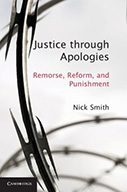Justice through Apologies: Remorse, Reform, and Punishment

Author: Nick Smith
Publisher: New York: Cambridge University Press, 2014. 413p.
Reviewer: Stephanos Bibas | July 2014
Lawnmowers often injure their users, so the Toro Company gets sued fairly often. Toro’s lawyers used to fight these cases aggressively, spending up to $100,000 on legal fees before settling cases just before trial for around $15,000. Then Toro’s management had a bright idea: save money and save face by settling cases earlier. A designated “good listener” would go to each injured person’s home, offer sympathy and a slightly higher settlement, admit no guilt, and hide the settlement behind a confidentiality agreement.
Toro’s litigation and insurance costs plummeted. Corporate lawyers and management gurus praised the (pseudo-)apology policy as a “strategic competence,” saving money and preserving corporate reputations, and copycats rushed to follow suit. Plaintiffs’ lawyers reacted against this apology trend, in part because lower settlements mean lower contingency fees for them.
The Toro strategy exemplifies how our amoral legal system commodifies and warps apologies, yet also how much victims value and need them. In Justice Through Apologies, philosopher Nick Smith adroitly navigates the space between what he regards as the ideal of a categorical apology and the sausage factory that is the American legal system. He blends idealism and realism, taking what we can get while still aspiring to more.
Ideally, Smith explains, a wrongdoer categorically admits blame and guilt, repudiates his wrong, makes amends, and commits himself to changing his ways. By doing so, he not only offers the victim compensation and closure, but also transforms himself and heals his relationship with the victim, who is often a friend, relative, or neighbor. (For the most part, Smith focuses on a single wrongdoer and a single, completely innocent victim; he does not dwell on less-culpable wrongdoers, blameworthy victims, collective guilt, or transitional justice.) One of Smith’s key insights is that “apologies are treatments not cures” processes of reformation and transformation rather than one-time statements (p.310).
These deeply moral values, he notes, fit uneasily into the zero-sum, profit-driven, adversarial legal system. Categorical apologies expose wrongdoers to liability, so defense lawyers silence their clients. To cash in on apology’s value, defense lawyers offer up scripted non-apologies that express sympathy without accepting blame. Doing so not only reduces defendants’ settlements in current cases, but minimizes future exposure and so reduces the pressure to change their ways.
Criminal defendants do much the same, remaining silent until their lawyers negotiate plea bargains. Even after pleading guilty, defendants virtually never speak to victims, but read apologies written by their lawyers to sentencing judges in the hopes of earning sentence discounts. Judges, in turn, award virtually automatic discounts for “acceptance of responsibility”; in practice, almost any guilty plea qualifies, no matter how terse or insincere.
In criminal justice, Smith argues, judges should not force defendants to apologize but should encourage them to do so with sentencing discounts. He is skeptical that the state has the ability or right to make people become good, and he worries that doing so would trample on wrongdoers’ autonomy and dignity. He recognizes, however, that apologies fall along a spectrum of voluntariness: sentence discounts are themselves powerful but permissible inducements. Just as we order our children to apologize grudgingly so that they internalize and learn their lessons, so too defendants should profess and learn respect for other people’s rights and well-being. Moreover, even grudging or somewhat insincere public apologies vindicate victims, bring them closure, and teach lessons to others.
There are practical limits to what the state can do, and moral limits to permissible means (such as torture, permanent exile, and extreme humiliation). On the positive side, temporary punishment and shame followed by apology rituals can help to reintegrate wrongdoers once they pay their debts to society and victims. Forgiving and reintegrating wrongdoers is one area in which the American criminal justice system does an unconscionably bad job. Unfortunately, Smith’s book focuses so narrowly on apology itself that he has much less to say about forgiveness, closure, and reintegration, which ideally should follow apologies. Nor does he say much about the restorative-justice movement, which promotes apologies and restitution to supplement (indeed, supplant) traditional punishment.
Smith does, however, defend the central roles of blame and individual responsibility in criminal justice, against the plea bargaining system’s habit of commodifying and routinizing them. And he persuasively explains how apology lessens the amount of punishment that a defendant deserves: it retracts the insult inflicted by the crime, revises the bad message sent by the crime, and averts a downward spiral of crime. In other words, a crime is not just an isolated act, but an evil episode that can be partly undone by later chapters in the same book. We cannot erase history, but we can edit its ongoing effects. I would add that apologies repair the breach in part by setting the stage for forgiveness, which (as Hannah Arendt wrote in The Human Condition) “release[s us] from the consequences of what we have done” (2d ed. 1998, p.237).
As for civil justice, Smith is attentive to the role of money and the danger of commodifying a deeply moral process. Yet, he rightly notes, money is “the best of flawed methods of redress,” in part because “[m]oney conveys a certain kind of gravity” in our society (p.318). Apologies can supplement restitution or punishment, but for moderately serious crimes or civil wrongs cannot supplant it. Smith is particularly good in criticizing faux and semi-apologies; lawyers try to debase the currency by expressing sympathy without taking blame, but accepting blame is the linchpin of an apology. Regretting a victim’s distress or injuries is no substitute for expressing remorse for one’s wrongful acts.
The American adversarial legal mindset pulls us away from humbling ourselves and reconciling with one another. It cheapens a priceless moral good. Smith recognizes that this tension is woven into American culture. “As long as defending a legal action feels more natural than apologizing—and as long as accepting blame feels more shameful than brazenly denying it—treadmills of contrition will churn out perverse injustices” (p.329). But we humans viscerally need to apologize and forgive.
The legal system, I would argue, leaves far too little room to accommodate that felt need. Reformers, from restorative justice on the left to prison ministries on the religious right, have found ways to bring together wrongdoers and victims to talk directly to each other. Our criminal justice system needs to return to its roots as a cathartic morality play, healing and reconciling wrongdoers, victims, and communities. But our modern plea-bargaining machine is largely deaf to these cries.
Stephanos Bibas is a professor of law and criminology at the University of Pennsylvania and the author of The Machinery of Criminal Justice (Oxford 2012).


